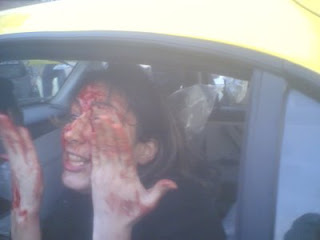The story behind hijacking biggest day in Iran
President Ahmadinejad sought to divert attention from the protests by announcing that Iran Iran
Opposition websites claimed a young woman named Leila Zareii, was killed and many others were wounded or arrested. The opposition leaders Mehdi Karroubi and Mohammed Khatami - a former president - were attacked, as was Zahra Rahnavard, wife of the Green Movement’s other leader, Mir Hossein Mousavi.
Even Zahra Eshraghi, granddaughter of Ayatollah Ruhollah Khomeini, leader of the 1979 revolution, was briefly arrested. She and her brother, Hassan, are both opposition sympathisers and she is married to Mr Khatami’s brother.
“It's pretty clear that Greens everywhere will feel demoralised... The overall feeling is one of disappointment,” one well-placed source in Tehran
The regime was determined to prevent the so-called Green Movement from hijacking the biggest day in Iran
It filled Azadi Square
Most foreign journalists are banned from Iran Azadi Square
Opposition websites said Revolutionary Guards and basiji militiamen were stationed everywhere and that they moved swiftly and violently to break up opposition demonstrations.
They claimed the security forces used live ammunition, knives, teargas and paintballs that would enable them to identify protesters later and that they were beating and arresting women as well as men. They were backed up by water canon, new Chinese anti-riot vehicles and helicopters. Some, wearing plain clothes, infiltrated the protesters. The mobile telephone, internet and text messaging systems were seriously disrupted.
Mr Karroubi’s son, Hussein, said his father had to get out of his car and walk towards Sadeghieh Square
Mr Karroubi’s bodyguards had to bundle him into a passing car which managed to drive him away, but not before the security forces smashed its windscreen. One of the bodyguards was seriously injured. Mr Karroubi’s other son, Ali, was arrested.
Film clips taken with mobile telephones showed opposition supporters chanting “Death to the dictator” on streets and in subway trains and ripping down a poster of Ayatollah Khomeini. Unrest was also reported in Shiraz , Isfahan
It was also impossible to calculate how many opposition supporters turned out as their demonstrations were scattered. However the numbers appeared to be significantly smaller than on December 27, the holy day of Ashura, even though the Green movement’s three leaders had, unusually, urged their supporters to protest.
One protester insisted the opposition had come out in significant numbers, but “the problem was that we were not able to gather in one place because (the security forces) were very violent”.
Another said: “It means they won and we lost. They defeated us. They were able to gather so many people. But this doesn’t mean we have been defeated for good. It’s a defeat for now, today. We need time to regroup.”
Major General Gholam-Ali Rashid, deputy chief of staff of the armed forces, was quoted as saying: "The massive turnout of the nation shocked the central command of the arrogant front, including the US , England









